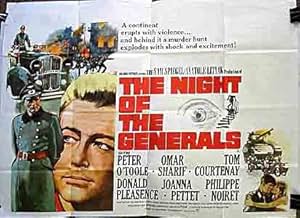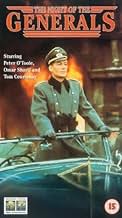En 1942, una prostituta polaca y un agente alemán son asesinados en Varsovia. Las sospechas recaen sobre tres generales. Ante esto, el más alto grado de la inteligencia alemana busca una jus... Leer todoEn 1942, una prostituta polaca y un agente alemán son asesinados en Varsovia. Las sospechas recaen sobre tres generales. Ante esto, el más alto grado de la inteligencia alemana busca una justicia que acaba tardando décadas.En 1942, una prostituta polaca y un agente alemán son asesinados en Varsovia. Las sospechas recaen sobre tres generales. Ante esto, el más alto grado de la inteligencia alemana busca una justicia que acaba tardando décadas.
- Dirección
- Guionistas
- Elenco
- Premios
- 1 premio ganado en total
- Juliette
- (as Juliette Greco)
- Doctor
- (as Sacha Pitoeff)
- Colonel (War Room)
- (as Raymond Gerome)
Opiniones destacadas
Having been aware of this film for many years, I finally managed to catch a rare screening of it last night on British TV. Part of my curiosity to see it was due to the sheer weight of the cast:- Omar Sharif as Major Grau, Peter O'Toole, Donald Pleasence and Charles Gray as the Generals, plus Christopher Plummer, Tom Courtenay, Philip Noiret, Gordon Jackson, John Gregson, Harry Andrews, Nigel Stock and Patrick Allen - phew! The film itself starts quite promisingly as a murder mystery and maintains the interest while based in Warsaw. It features an impressive sequence involving the flushing out of Polish Resistance fighters in the city. An interesting side-note at this point is that the armour used here appeared to be either real Tiger tanks, or pretty good replicas. This attention to detail was quite unusual for a film made in 1966. Usually, contemporary armour was used in war films of this vintage - I'm thinking particularly of 'Battle Of The Bulge', 'The Bridge At Remagen' and even 'Patton'.
However, once the scene shifts to Paris in the summer of 1944, the film starts to lose focus, meandering off on sub-plots about the Hitler assassination conspiracy and Tom Courtenay's character's love life. For long stretches Omar Sharif disappears altogether and the momentum is lost. Another distraction is the way the film jumps forward at intervals to the '60's, where we find Philip Noiret's Policeman interviewing some of the secondary characters in an attempt to solve the mystery. But by this point the killer's identity has become all too clear.
The film is by no means a total waste. It is in part an interesting study of German senior officers. The acting is good throughout, and to see stalwarts of British war films like Harry Andrews and John Gregson playing Germans is both curious and original. The script is literate, production design handsome, and the 1.78:1 presentation on ITV3 gave a tantalising glimpse of how good Henri Decae's photography would look in it's full 2.35:1 Panavision frame. But overall I was left feeling that with tighter handling regarding the killer's identity, and more emphasis on the central plot, the film could have been a far more satisfying whole.
This isn't an easy movie to summarize, since there are at least three major plot-lines going on at the same time. In one, someone is killing prostitutes in occupied Warsaw and Paris, and Omar thinks the murderer is one of three leading Wehrmacht generals. In the second plot, various high-ranking officers are conspiring to overthrow Hitler and bring the war to an end. And in a third plot, Tom Courtenay's corporal is getting very close to the daughter of Charles Gray's untrustworthy General Gabler.
All three plots intersect, sort of, but I can't help wishing that someone had made up their mind just what sort of movie they wanted to make and stuck with it, rather than trying to make three at once. Courtenay's romantic sub-plot is entirely redundant, and should have been cut out completely, thus shortening the movie to a manageable two hours or so. And was there really any need for Christopher Plummer to saunter on in a minuscule cameo as Rommel? His appearance adds nothing to the story, and the only reason for him being here at all was presumably in order to employ every great British actor alive at the time. I'm only surprised that Laurence Olivier didn't turn up as Goebbels, or Himmler or someone.
And yet, despite the bloat, despite the stunt casting, despite the fact that Philippe Noiret is more wooden than the Black Forest, it works. I watched it for two and a half hours without getting bored, and I loved a lot of things about it - the characters interact beautifully, the tension in the conspiracy sequences builds up to near-unbearable levels, and the look of the thing is sumptuous in the extreme. You really feel you're there with these people, and you can't help but care about them and how the story comes out. In the end, that's what movies are supposed to do, isn't it? Night of the Generals is a long way from perfect, but it just about forced me to like it.
The film is brimming with exceptional acting - O'Toole turns in a particularly vicious and strong performance as General Tanz, but everyone holds their own. It's rare to find a villain so distasteful and yet so intriguing - most filmmakers just content themselves with giving the villain an evil shtick without much character development - not so here.
I saw a newly mastered DVD in full 2.35:1 widescreen presentation and the the cinematography by the late Henri Decae is wonderful in all its glory.
Very interesting movie, please see it.
¿Sabías que…?
- TriviaBecause Peter O'Toole and Omar Sharif were being held to contracts signed several years earlier, when they were less famous, they both had to accept smaller fees than one would expect, given how famous they were when this movie was made early in 1966. Neither was very happy with this situation, but they took care to claim the lavish living expenses to which they were entitled.
- ErroresMajor Grau is handed a German soldier's identity disc from the crime scene in Paris shortly before Operation Valkyrie commences. He reveals the name of the suspect by apparently reading the name on the disc. German identity discs, however, never contained the soldier's name on them - only their roll number, unit designation and occasionally their blood group.
- Citas
Major Grau: One of them is a... a murderer.
Inspector Morand: Only one? But murder is the occupation of Generals.
Major Grau: Then let us say what is admirable on the large scale is monstrous on the small. Since we must give medals to mass murderers, why not give justice to the small... entrepreneurs.
- Créditos curiososThe opening titles are a montage of a Nazi general's clothing and decorations.
- Versiones alternativasThe UK cinema version was heavily edited for an 'A' (PG) certificate and removed nearly all the references to the victims being whores, as well as shortening the bed scene between Hartmann & Ulrike, the police interrogation of the suspected sex offenders, and editing some of the dialogue describing the murders. Later releases were upgraded to a 15 certificate and were fully uncut.
- ConexionesFeatured in Discovering Film: Omar Sharif (2015)
Selecciones populares
- How long is The Night of the Generals?Con tecnología de Alexa
Detalles
- Fecha de lanzamiento
- Países de origen
- Idiomas
- También se conoce como
- The Night of the Generals
- Locaciones de filmación
- Mostowa, New Town, Sródmiescie, Varsovia, Mazovia, Polonia(shootout with Polish resistance)
- Productoras
- Ver más créditos de la compañía en IMDbPro
- Tiempo de ejecución2 horas 28 minutos
- Relación de aspecto
- 2.35 : 1
Contribuir a esta página







































